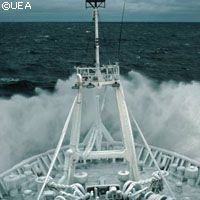Southern Ocean carbon sink weakened
The ability of the Southern Ocean to absorb carbon dioxide (CO2) from the atmosphere is weakening because of climate change, according to new research. The findings suggest that it may be harder to stabilise atmospheric CO2 levels than was previously thought. The study, which was partly funded by the EU through the Sixth Framework Programme (FP6), is published online by the journal Science. The Earth's land and oceans absorb around half of the CO2 pumped into the atmosphere by human activities, and the Southern Ocean takes up around 15% of these emissions, making it one of the world's most important carbon sinks. It is known that the world's carbon sinks are sensitive to a range of factors, including the climate. To find out what is going on in the Southern Ocean, an international team of researchers analysed atmospheric CO2 measurements from 11 stations in the Southern Ocean and 40 stations around the world from the period 1981-2004. They found that over the past 25 years, the ability of the Southern Ocean to absorb CO2 has dropped by around 15% per decade. The reason for this is an increase in wind strength over the ocean, as stronger winds influence the process of mixing and upwelling in the seas. This in turn causes more carbon dioxide to be released into the atmosphere and prevents uptake of CO2 from the atmosphere. Furthermore, these stronger winds are themselves due to human activity, as previous research has shown that higher concentrations of greenhouse gases in the atmosphere and the depletion of the ozone layer lead to more intense storms over the Southern Ocean. 'This is the first time that we've been able to say that climate change itself is responsible for the saturation of the Southern Ocean sink,' said lead author Corinne Le Quéré of the University of East Anglia and the British Antarctic Survey. 'This is serious. All climate models predict that this kind of 'feedback' will continue and intensify during this century. With the Southern Ocean reaching its saturation point more CO2 will stay in our atmosphere.' The research suggests that it will be harder than was previously thought to stabilise atmospheric CO2 levels. It also implies that the acidification of the Southern Ocean will reach dangerous levels earlier than predicted. In addition to this, the climate models predict that winds over the Southern Ocean will continue to intensify throughout the 21st century if atmospheric CO2 levels continue to go up. 'Since the beginning of the industrial revolution the world's oceans have absorbed about a quarter of the 500 gigatons of carbon emitted into the atmosphere by humans,' commented Professor Chris Rapley, Director of the British Antarctic Survey. 'The possibility that in a warmer world the Southern Ocean - the strongest ocean sink - is weakening is a cause for concern.'



